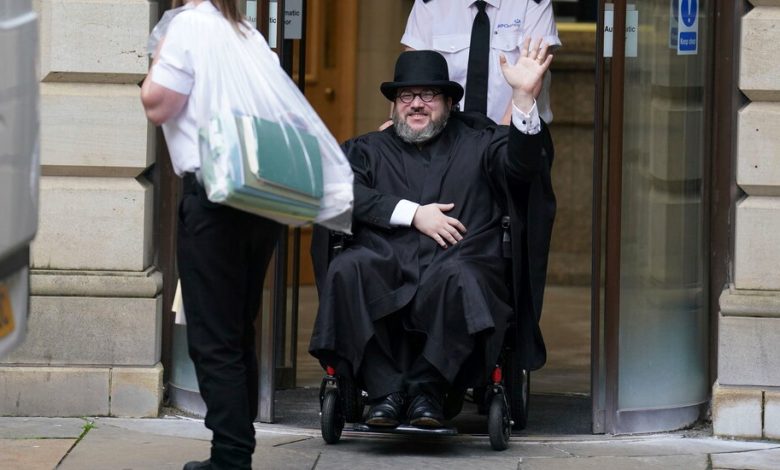American Fugitive Who Faked His Death Can Be Extradited, Scottish Court Rules

Nicholas Rossi, a convicted sex offender who faked his own death and later surfaced in Glasgow, can be extradited to the United States from Scotland to face sexual assault charges in Utah, a court ruled on Wednesday.
Mr. Rossi, 36, traveled from the United States to Ireland or Britain in 2017, leaving behind allegations of rape and domestic violence, according to the decision by Sheriff Norman McFadyen in Edinburgh Sheriff Court.
Mr. Rossi has used several aliases over the years, including Nicholas Alahverdian, the name he was using when he faked his death in Rhode Island in 2020. He identified himself as Arthur Knight, an Irishman who had never been to the United States, during court hearings in Scotland after his arrest there in December 2021.
Sheriff McFadyen said in his 21-page decision that the evidence Mr. Rossi provided about himself in his defense could not be trusted unless it was independently supported.
“I conclude that he is as dishonest and deceitful as he is evasive and manipulative,” Sheriff McFadyen said. “These unfortunate facets of his character have undoubtedly complicated and extended what is ultimately a straightforward case.”
Mr. Rossi can appeal the court’s extradition decision. His lawyer, Mungo Bovey, did not respond to requests for comment.
The case will now be sent to Scottish government ministers, who will have two months to order the extradition.
Prosecutors in Salt Lake County and Utah County, Utah, have said that they were pursuing Mr. Rossi’s extradition. He has been charged with rape in Salt Lake County and he is the suspect in a sexual assault case in Utah County.
During the rape investigation in Salt Lake County, investigators found that Mr. Rossi had been involved in criminal cases of sexual assault, harassment and possible kidnapping in Rhode Island, Ohio, Utah and Massachusetts, according to the charging document.
To rule on extradition, Sheriff McFadyen had to consider issues including Mr. Rossi’s health and his ties to Britain. Three medical professionals and three American legal professionals testified in the case. Mr. Rossi appeared in court on Wednesday in a video call from an Edinburgh prison, the BBC reported.
Mr. Rossi had been using a wheelchair during hearings, but the sheriff said that he was skeptical that it was needed.
“He contradicted himself as regards the length of time he had been in a wheelchair in the same breath,” Sheriff McFadyen said. “His claim that he could not lift his arms above his head and keep them there because of atrophy in his arms was contradicted by his behavior during the proceedings, when he regularly raised and kept his hand raised during the hearing as he tried to engage the attention of the court.”
Sheriff McFadyen said that some mental health professionals had suggested that Mr. Rossi could have a personality disorder, but a diagnosis could not be reached, in part because of Mr. Rossi’s “long history” of not cooperating with medical professionals.
The sheriff said that Mr. Rossi’s “roots in this country are shallow,” and that it “would indeed require a fairly deep dive through the looking glass even to contemplate that Mr. Rossi could claim a right of residence in the United Kingdom.”
There was no evidence that Mr. Rossi had any family, friends or other support in the country, Sheriff McFadyen said, aside from his wife, “who I do not doubt is devoted to him.”
Before Sheriff McFadyen could consider extradition, he had to confirm last year in a separate proceeding that the man who said he was Mr. Knight was in fact Mr. Rossi. The sheriff said he reviewed photographs of Mr. Rossi’s arm tattoos that had been provided by the authorities in the United States and fingerprint analysis.
Mr. Rossi, while going by Mr. Knight, told the court in that hearing that he had been tattooed while in a coma at the Queen Elizabeth University Hospital in Glasgow and that a nurse there had taken his fingerprints in October 2021 and given them to prosecutors in the United States. Sheriff McFadyen said these claims were “implausible and fanciful” and not supported by evidence.
U.S. authorities announced in January 2022 that the Scottish authorities had arrested Mr. Rossi on Dec. 13, 2021. The Utah County Attorney’s Office said he had been identified in photos while he was hospitalized in Glasgow. He was treated there after becoming seriously ill from the coronavirus, according to the Scottish court.
Mr. Rossi had been identified in 2018 as the suspect in a 2008 sexual assault in Utah after his DNA was found to match genetic information taken from the victim during a forensic medical examination, the Utah County Attorney’s Office said. The rape kit had been languishing on the shelf for nearly a decade.
The authorities in Utah found the victim, who wanted to pursue a case. Investigators said that they then learned that Mr. Rossi had fled the country and that he had tried to convince investigators in other states that he was dead. The Utah County Attorney’s Office said in January 2022 that it had been working with federal and international agencies on his extradition. The office could not be reached for comment on Wednesday.
In January 2022, David O. Leavitt, then the chief prosecutor in Utah County, told The New York Times that Mr. Rossi had been convicted of sexual imposition and public indecency in Ohio in 2008. He had to register as a sex offender after the conviction.
The Salt Lake County District Attorney’s Office charged Mr. Rossi with rape in September 2022. He is accused of raping a woman whom he met online and dated in 2008.
Investigators said the cases in Utah and other states showed a pattern: Mr. Rossi would meet in public with women he had met online, then take them somewhere private and touch them inappropriately. When the women objected, he would either threaten to kill himself or “force a non-consensual sexual encounter,” according to the Salt Lake County charging document.
The announcement of Mr. Rossi’s arrest in January 2022 brought attention to news reports about the February 2020 death of Nicholas Alahverdian, a Rhode Island child welfare reform advocate. Prosecutors in Utah and the Rhode Island State Police said Mr. Alahverdian was not dead and that the name was one of many aliases used by Mr. Rossi.




